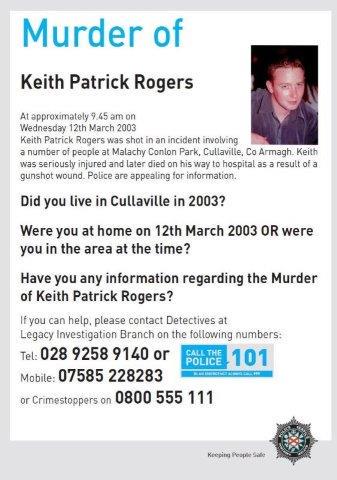A man who has spent almost three decades in jail for the murder of a Garda sergeant in Tallanstown has lost a High Court action aimed at securing his immediate release from prison.
The action was brought by Michael McHugh, who shot dead Sgt Patrick Morrissey following an armed robbery in Co Louth in 1985.
McHugh, with an address at Clonalig, Crossmaglen, Co Armagh and Noel Callan, formerly of Cullaville, Castleblayney, Co Monaghan were convicted by the non-jury Special Criminal Court in December 1985 of the murder of Sgt Morrissey (49) at Rathbrist, Tallanstown, on June 27th, 1985 following an armed robbery at Ardee Labour Exchange.
Sgt Morrissey was initially wounded by McHugh, before he shot the unarmed garda in the head.
McHugh was initially sentenced to death for the murder. The sentence was commuted to one of 40 years penal servitude by the then president Patrick Hillery, seven days before the execution was scheduled to be carried out.
In proceedings against the Governor of the Prison, the Minister for Justice, the Irish Prison Service and the DPP McHugh claimed when the 25 per cent remission generally granted to incarcerated persons is taken into account he is due for release after 30 years, which he says he has served.
He argued he was not given credit for five months he spent in custody, between July 3rd and December 3rd 1985, before his trial for the garda’s murder concluded and should be released immediately.
In his judgment Mr Justice Paul McDermott dismissed McHugh’s case stating under the separation of powers the court could not compel the Minister for Justice to further commute or remit the sentence.
In this case the commutation of McHugh’s sentence was wholly separate from the judicial process, the judge said.
Unlike the President of Ireland and the Minister for Justice, who have a very wide discretion in such matters, the courts have no function in exercising powers of pardon commutation or remission.
The judge also found there was “no legal basis” for the proposition that a failure by a court or the executive to backdate a sentence imposes an obligation on the Minister to consider or grant a further reduction of a sentence.
The judge said the Minister has the discretion to consider McHugh’s application to be given credit for the five months in custody, but is not obliged to do so.
The Minister was also entitled to take other considerations into account such as “the grievous nature of the offence. when considering such applications.
The judge added there was “no evidence” in this case the Minister’s failure to further commute the sentence by five months could be described as being arbitrary, capricious or irrational.
McHugh has served his sentence at the maximum security Portlaoise Prison, and is due for release in December. However he has a separate, but related action also aimed at securing his release pending before the High Court.
He had sought various orders and declarations including he is entitled to be credited with the time he served in pre-trial custody.
McHugh further claimed the failure to give him credit for those five months he spent in prison amounts to a breach of his rights to natural and constitutional justice.
His application was opposed by the State parties, on grounds including McHugh does not have an automatic entitlement to be given credit for the five months in question. They also argued they do not have the power to take the five months into account as the original court sentence imposed was the death penalty.
Source: The Irish Times




